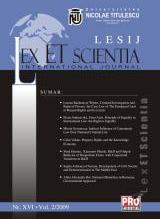COSTS AND BENEFITS OF EURIZATION IN KOSOVO
COSTS AND BENEFITS OF EURIZATION IN KOSOVO
Author(s): Mihane Berisha-Namani, Myrvete Badivuku-PantinaSubject(s): Economy
Published by: Universitatea Nicolae Titulescu
Keywords: Kosovo economy; German Mark; Euro; Costs; Benefits
Summary/Abstract: One of the many challenges that Kosovo faced after the conflict of 1999 was the selection of a monetary structure. At the time when the United Nations undertook the administration of Kosovo (UNMIK), adoption of the monetary structure based on the utilization of the German Mark appeared as a natural solution. Utilization of a sustainable currency was important in maintaining macroeconomic stability and played a key role in the reestablishment of people’s trust in the financial sector. There was an immense urgency for assuring cash currency and the abolition of the Yugoslav Dinar as a means of transaction. At the beginning of 2002 when the replacement of the inherited currency in Euro was carried out in the Eurozone countries, it was also necessary to replace the German Mark in Kosovo. In accordance with UNMIK Regulation No. 1999/4, EURO (“EUR”) was adopted as an official currency in Kosovo as of January 1st 2002. EURO replaced the German Mark (“DEM”) which was the measurement and reporting currency in the territory of Kosovo. The objective of this paper is to present the costs and benefits brought to the Kosovo economy by the utilization of Euro as its main currency in circulation, and to what extent are the costs acceptable compared to the advantages that were brought by the introduction of Euro in the Kosovo economy.
Journal: LESIJ - Lex ET Scientia International Journal
- Issue Year: XVI/2009
- Issue No: 2
- Page Range: 343-353
- Page Count: 11
- Language: English

